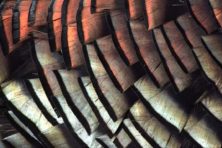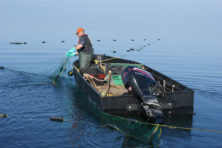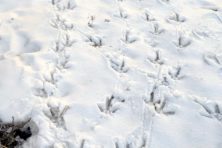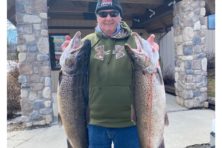Wild Things: Scientist Says Wolves Have Recovered
- Share
- Tweet
- Pin
- Share
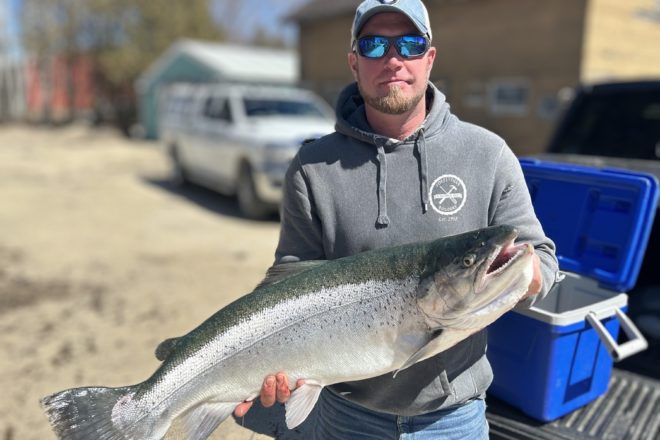
Former DNR, USFWS ecologist promotes delisting
by KEVIN NAZE, [email protected], Peninsula Pulse contributor
A former state and federal wildlife research ecologist and scientist, Nathan M. Roberts, appeared recently before Congress regarding H.R. 764, a bill to delist wolves from the Endangered Species Act (ESA) and return management to the states.
The bill – known as the Trust the Science Act – was reintroduced in February by U.S. Congressman Tom Tiffany, Wisconsin’s 7th District representative; and Congresswoman Lauren Boebert of Colorado.
Roberts, an expert on the scientific research and data on furbearers and carnivores, testified on his own behalf before members of the Subcommittee on Water, Wildlife and Fisheries.
“The gray wolf in the United States is recovered, no longer in danger of extinction, and should be removed from the Endangered Species Act of 1973,” Roberts said in his opening statement.
An associate professor in the College of the Ozarks’ Conservation and Wildlife Management degree program, Roberts previously worked for the Wisconsin Department of Natural Resources (DNR) for six and a half years as the primary bear, wolf and furbearer research scientist. Prior to that, he worked for the U.S. Fish and Wildlife Service (USFWS) as an ecologist and biometrician for the National Wildlife Refuge System in the Alaska region, which covered 16 refuges.
Roberts said there are more than 4,200 wolves in the Great Lakes region alone – at least 10 times the numeric goals set as criteria for determining successful recovery.
“By not delisting the wolves, even after they have far exceeded recovery goals, the integrity of the ESA is compromised,” Roberts said. “Sadly, the result is that science is devalued, partnerships are avoided, the public is disenchanted, and conservation suffers.”
Talking Turkey
A number of youth and beginner adult hunters were able to get a jump start on the turkey-hunting season through Learn to Hunt programs last weekend.
Next up is the youth hunt, set for this weekend, April 15-16. It’s for those aged 15 and younger who have a valid spring turkey hunting license, stamp and harvest authorization.
Youths aged 12-15 must have completed a hunter safety education course in order to participate in the hunt, unless they are going out under Mentored Hunt Program rules. Those aged 11 and younger must participate under the mentor rules, even if they have completed a safety course.
Meanwhile, the first of six seven-day regular spring wild-turkey hunting periods begins April 19. As of April 11, there were still several hundred Zone 2 permits available for the sixth period, May 24-30.
Wild-turkey hunting is allowed in some state parks and on many land trust and conservancy properties in Door County. When hunting in parks that do allow it, observe the closed areas. Spring hunting in state parks ends May 2.
Learn more at dnr.wisconsin.gov/topic/hunt/turkey.
Earth Day, Arbor Day
A Wisconsin tradition since 1970, Earth Day is Saturday, April 22, this year. The event is recognized around the world in nearly 200 countries, and the 2023 theme is Invest in Our Planet.
Find 10 ways to make any day Earth Day at dnr.wisconsin.gov/wnrmag/2020/Spring/EarthDay, and learn more at earthday.org/earth-day-2023. Also see the listing of local Earth Day events in the Green section of this issue of the Peninsula Pulse.
Meanwhile, National Arbor Day is Friday, April 28. Arbor Day – which has its roots in Nebraska in 1872 – is a day to recognize the vital importance of trees and forests, including the many ways in which they improve our environment and serve our everyday needs. Get tips on planting trees, and learn more at dnr.wisconsin.gov/education/arborday and arborday.org.
Earth Day and Arbor Day are also good times to get involved with volunteer activities. Check out the opportunities at dnr.wisconsin.gov/volunteer.

Trout Tournament
Trolling and casting are allowed in all Wisconsin waters off Door and Kewaunee counties during the Baileys Harbor Brown Trout Tournament April 13-16. Keep up with the catches this weekend at facebook.com/BaileysHarborBrownTrout.
Last year’s event featured one of the closest finishes ever, with just five-hundredths of a pound separating the top two fish. The top 25 browns ranged from 12.99 to 21.54 pounds.
Weekly Water Levels
Lake Michigan water levels have risen four inches during the past month, and as of April 7, they were 36 inches higher than the record monthly low, set in 1964.
Water levels were down 30 inches from the all-time April high, set in 2020. Lake levels were listed at five inches above the 100-year average.
Virtual Hearing Is Over
The 2023 Wisconsin DNR and Wisconsin Conservation Congress spring hearing offered online input earlier this week. Results, which are advisory only, will be posted at dnr.wisconsin.gov/about/wcc/springhearing as soon as they become available.
New Site Launching
An updated and mobile-friendly version of the National Data Buoy Center website – with a look similar to other National Weather Service sites – will be launched April 19. Plan to check it out via ndbc.noaa.gov.
Sticker Contest Deadline
If you’re a high school artist who’s interested in submitting a design for the 2024 State Park Vehicle Admission Sticker Contest, get the details at dnr.wisconsin.gov/topic/parks/designcontest, and submit your entry by the April 30 deadline.

